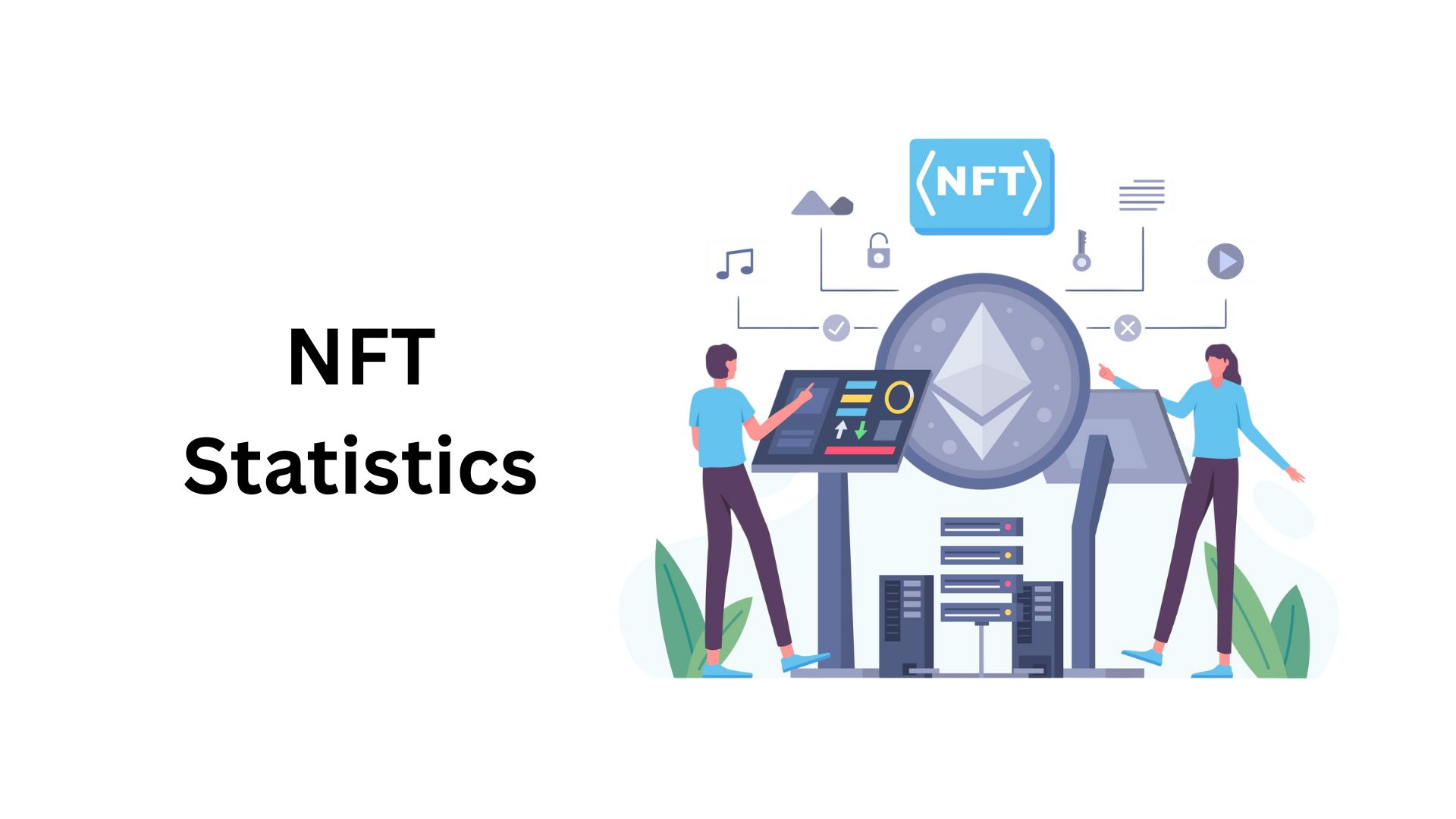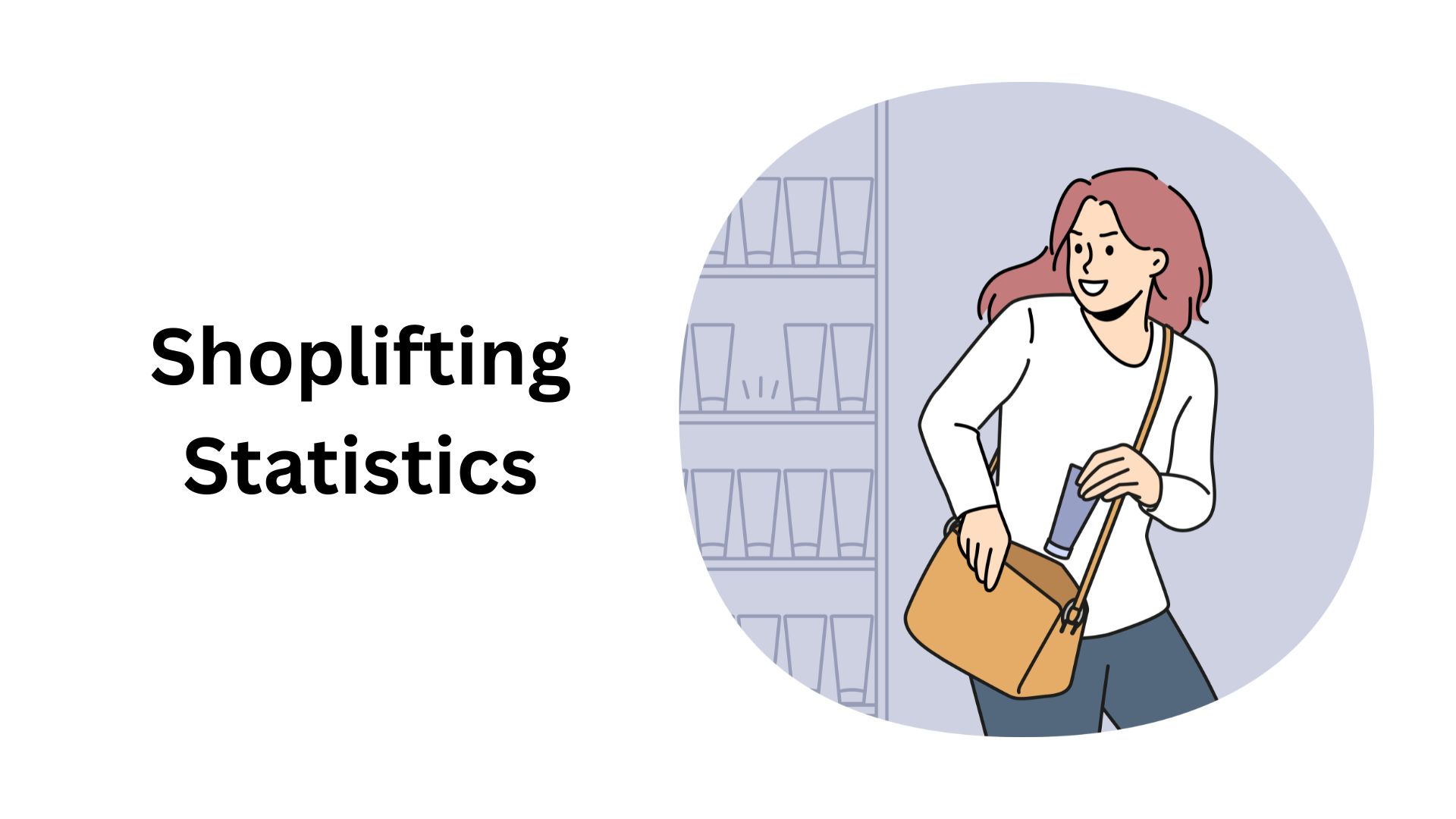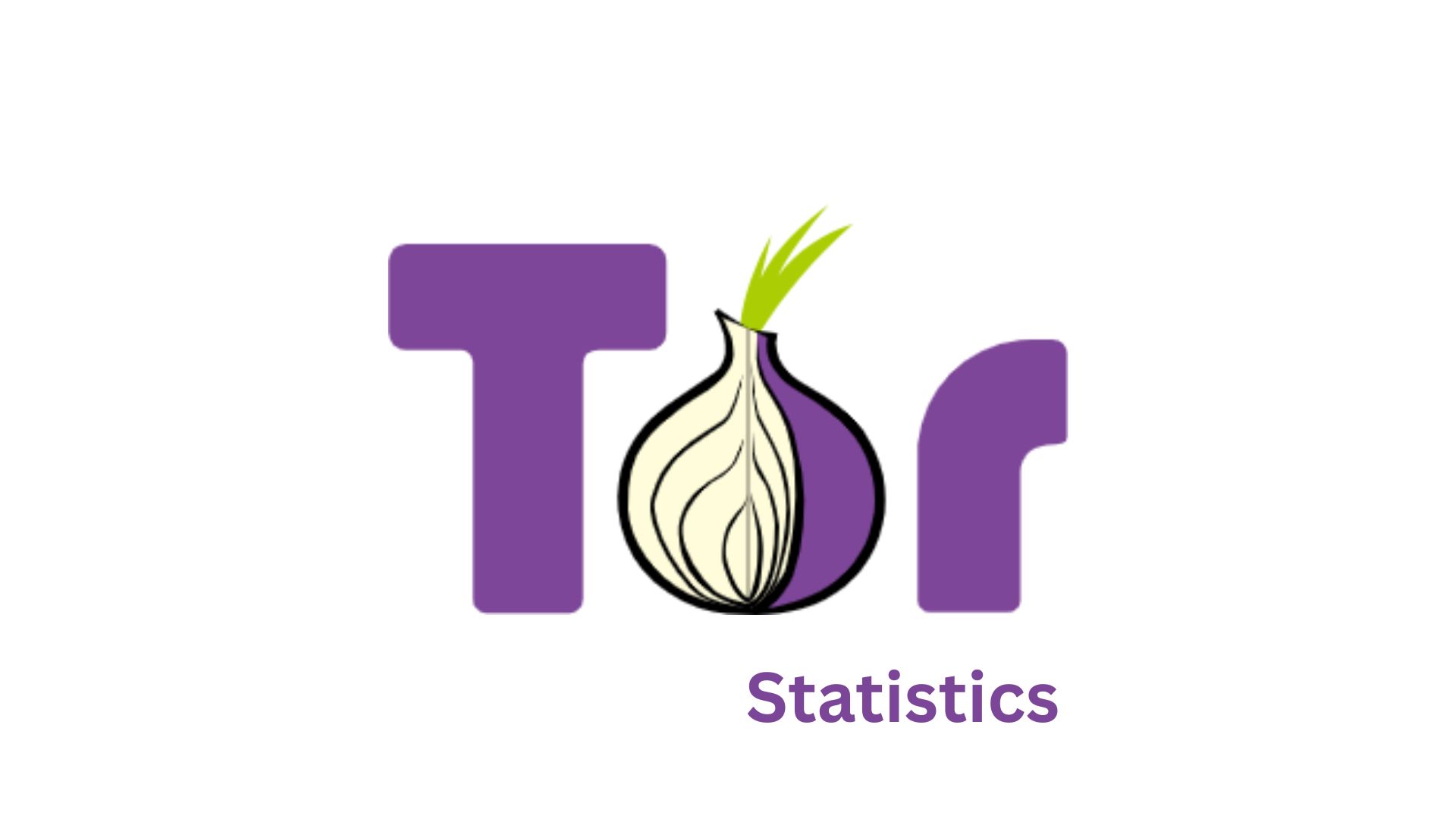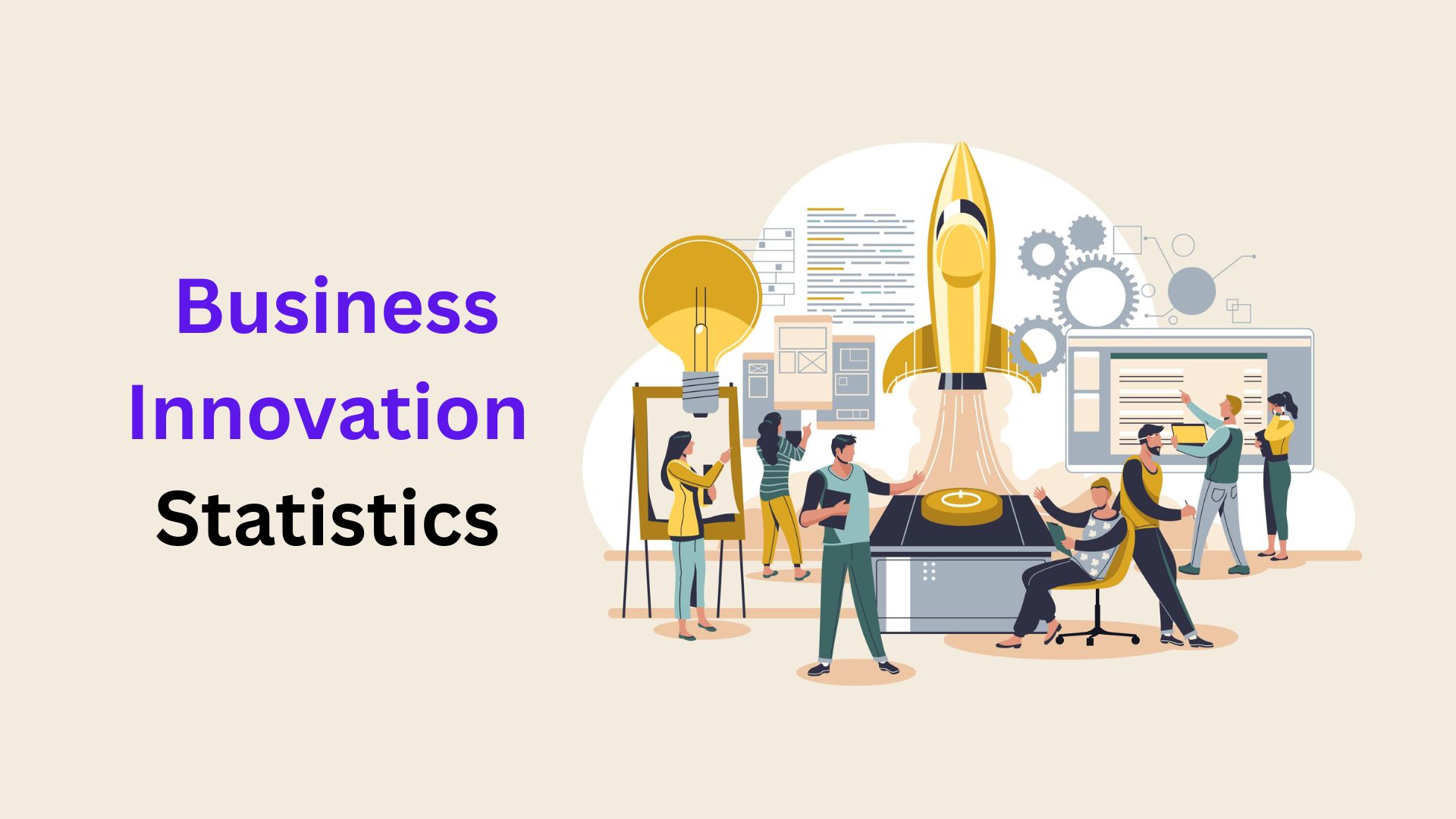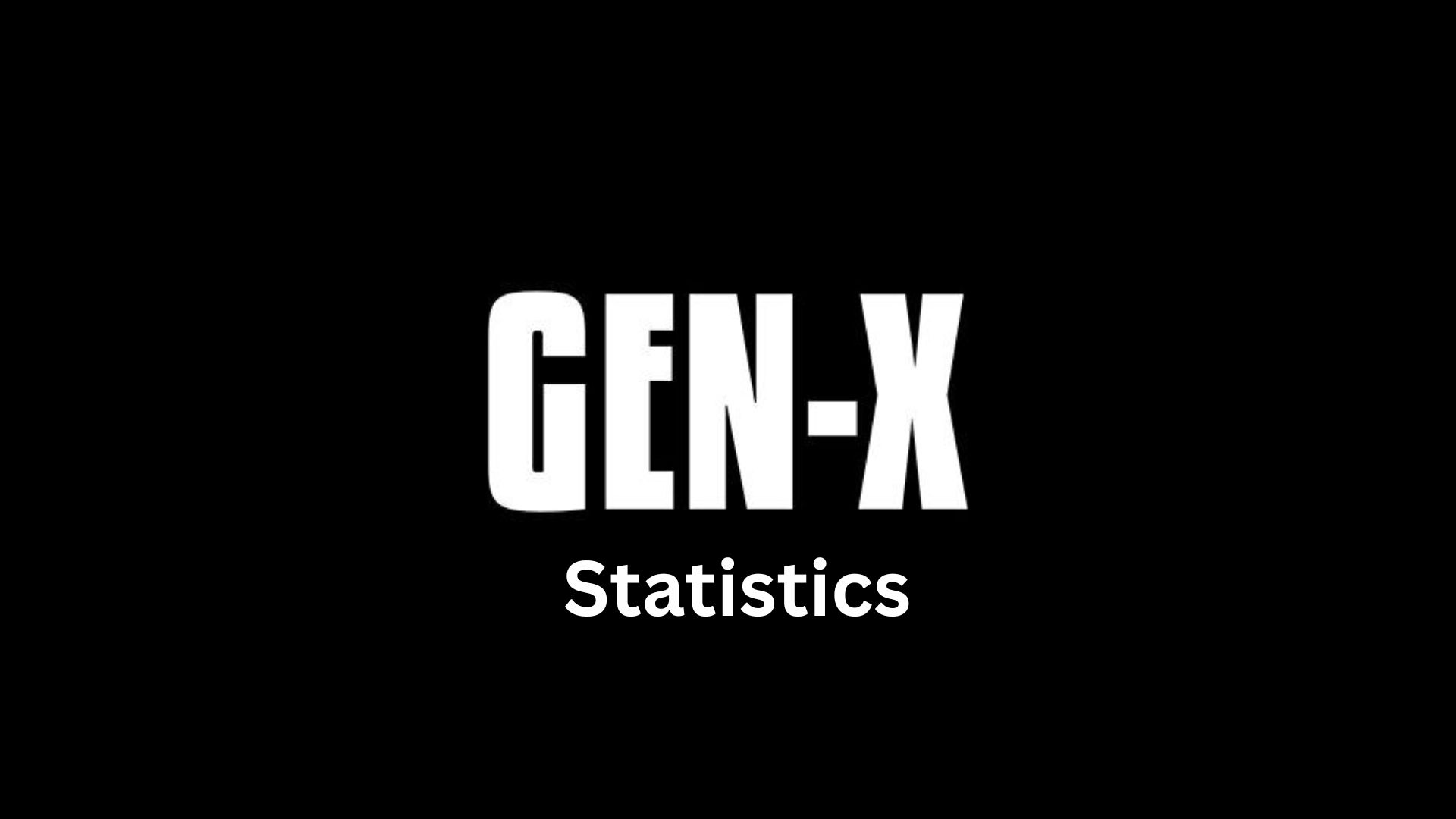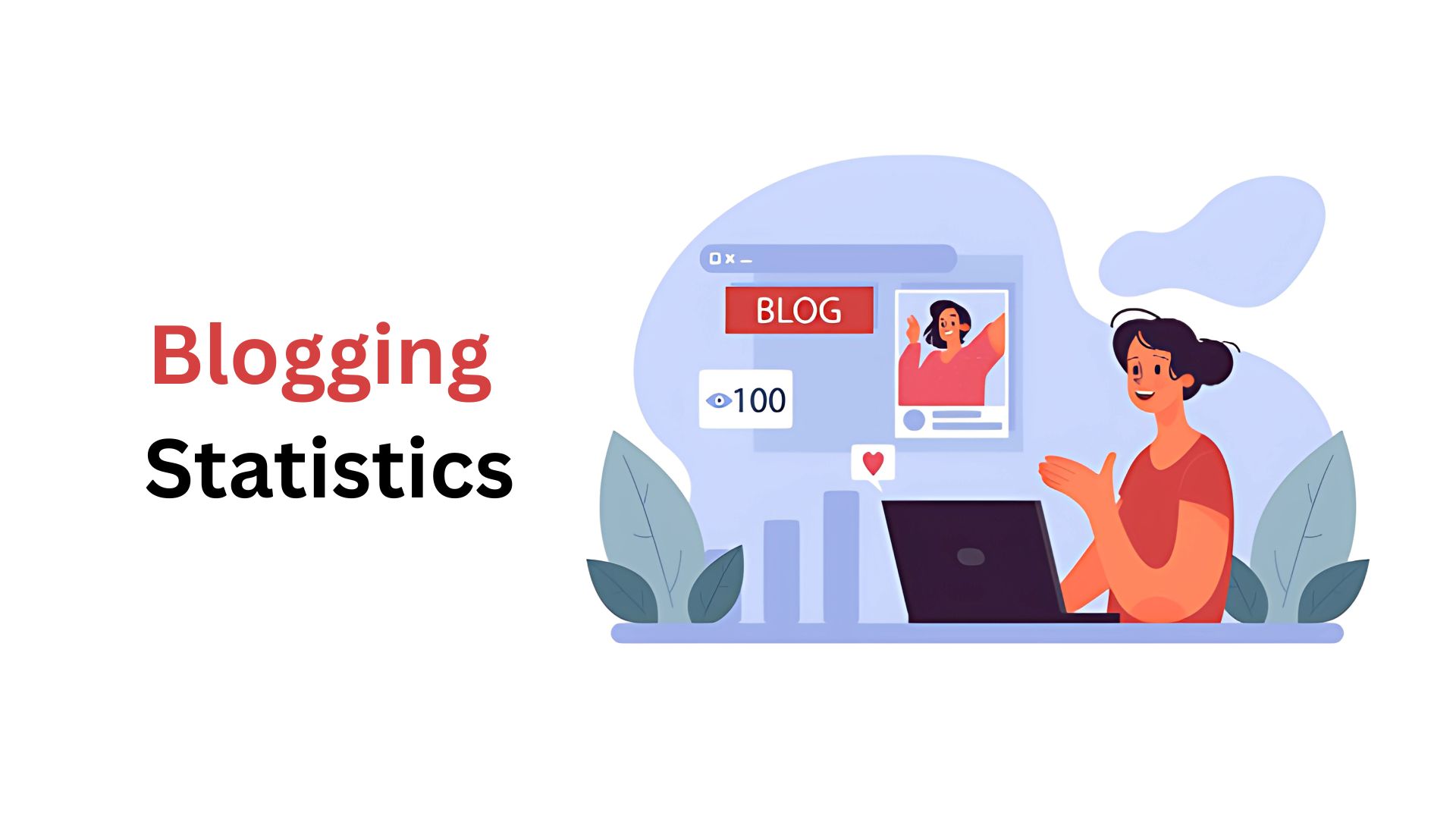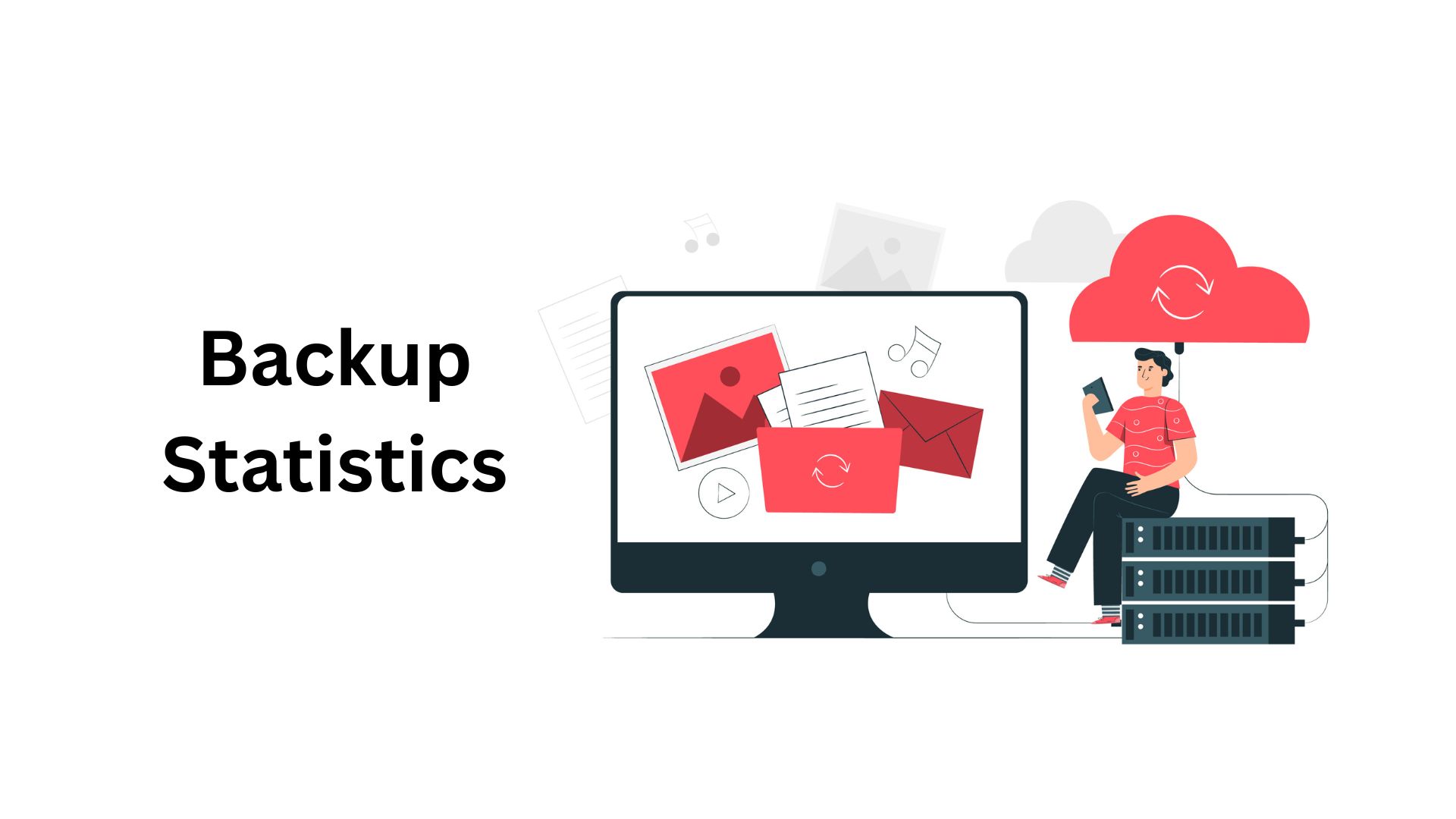Quantum Computing Statistics By Fundings, Investment Share, Revenue And Applications
Updated · Aug 27, 2024
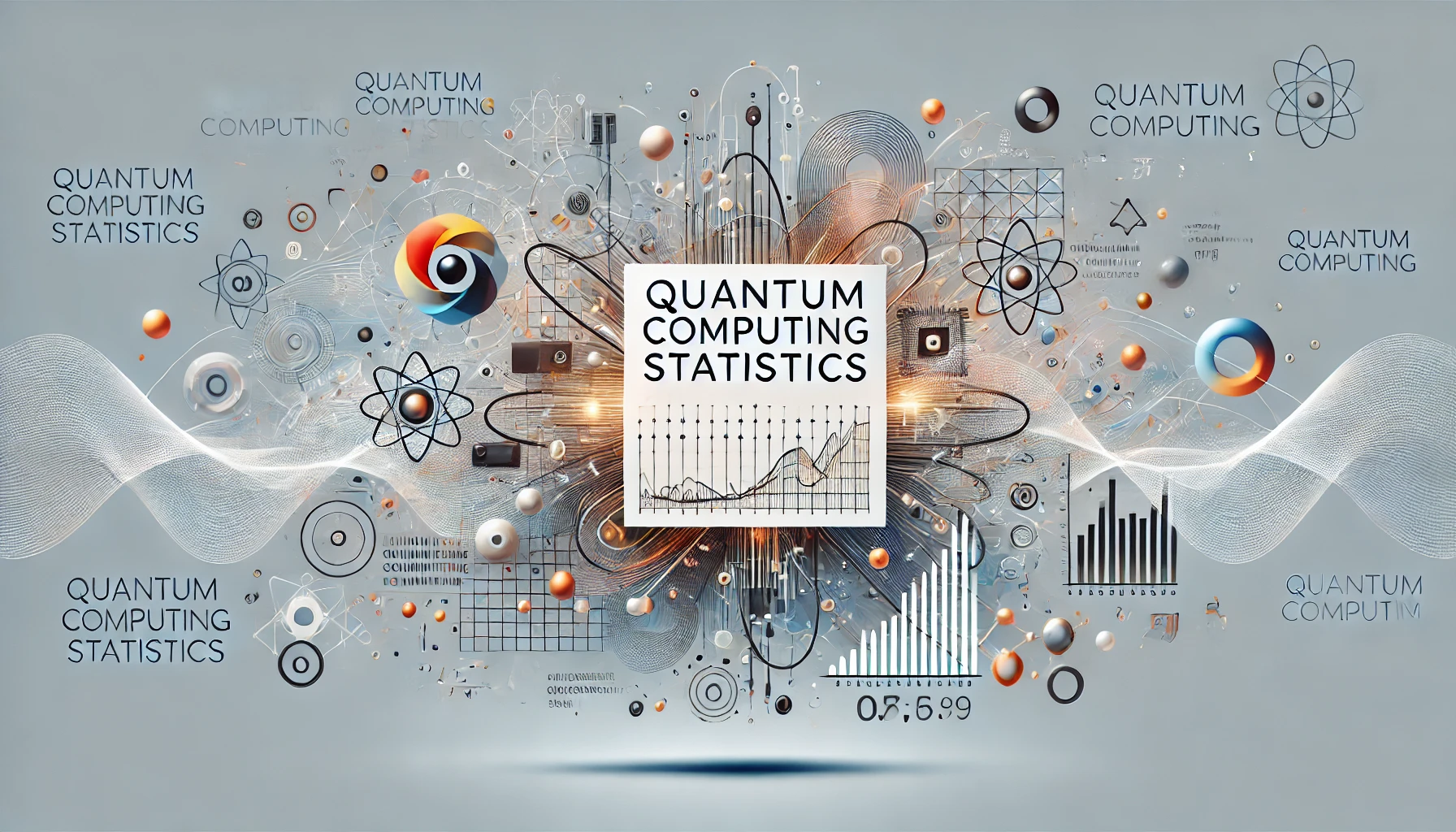
Table of Contents
- Introduction
- Editor’s Choice
- Fundings For Quantum Computing Technologies
- Investment Share Worldwide For Quantum Computing Growth
- Quantum Technology Investment Share Type
- Quantum Computer Forecast For Business Growth
- Quantum Security Market Revenue
- Quantum Security Worldwide Revenue
- Quantum Security Market Worldwide Segmentation
- Most Desired Quantum Computing Applications
- Consideration Among Organizations While Assessing Quantum Computing Vendors Worldwide
- Quantum Sensing Startups’ Presence On A Global Scale
- Quantum Computing Funding As Per Country
- Quantum Computing Overview
- Conclusion
Introduction
Quantum Computing Statistics: Quantum computing is a field of computing that focuses on the concepts related to quantum mechanics. It refers to the aspects associated with hardware research and application development. These computers can solve problems based on superimposition and quantum interference.
By taking advantage of quantum mechanical effects, it is possible to boost the productivity of machine learning applications and AI technologies. It would be interesting to refer to quantum computing statistics to understand how it complements the growth of industries in business.
Editor’s Choice
- Quantum computing market is valued at USD 1.5 billion in 2023.
- By 2030, Quantum security market revenue is expected to reach USD 9.7 billion.
- USA leads in Quantum sensing startups with 14 companies.
- Referring to Quantum computing statistics, USD 500 million will be spent on cryptography in 2023.
- Quantum sensing technology is expected to generate USD 7 billion by 2040.
Fundings For Quantum Computing Technologies
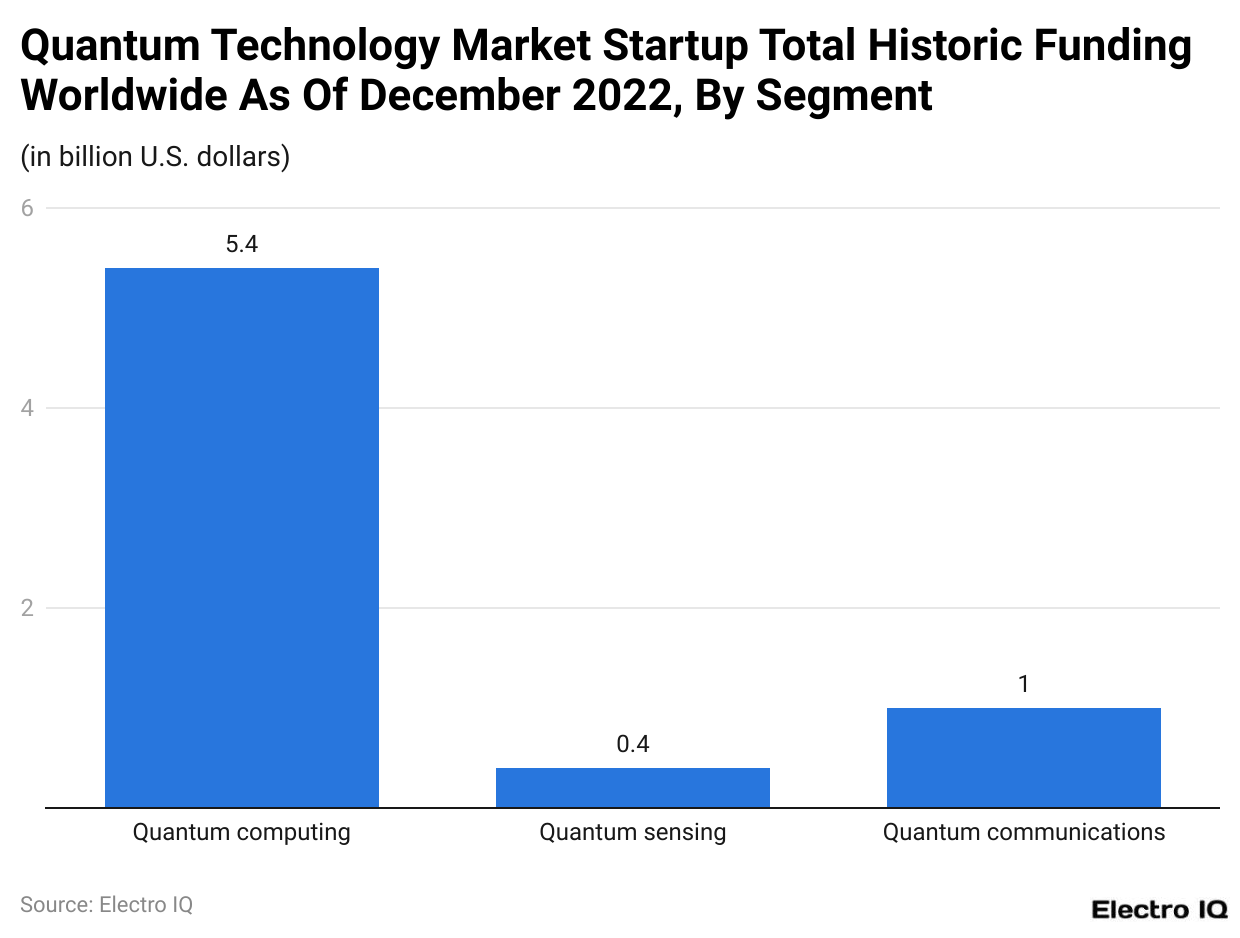
(Reference: statista.com)
- Different quantum mechanics technologies have garnered significant funding.
- Various startups based on Quantum funding received an accumulated $5.4 billion in 2022.
- Quantum sensing and quantum communications-focused organizations received $0.4 billion and $1 billion in funding per quantum computing statistics.
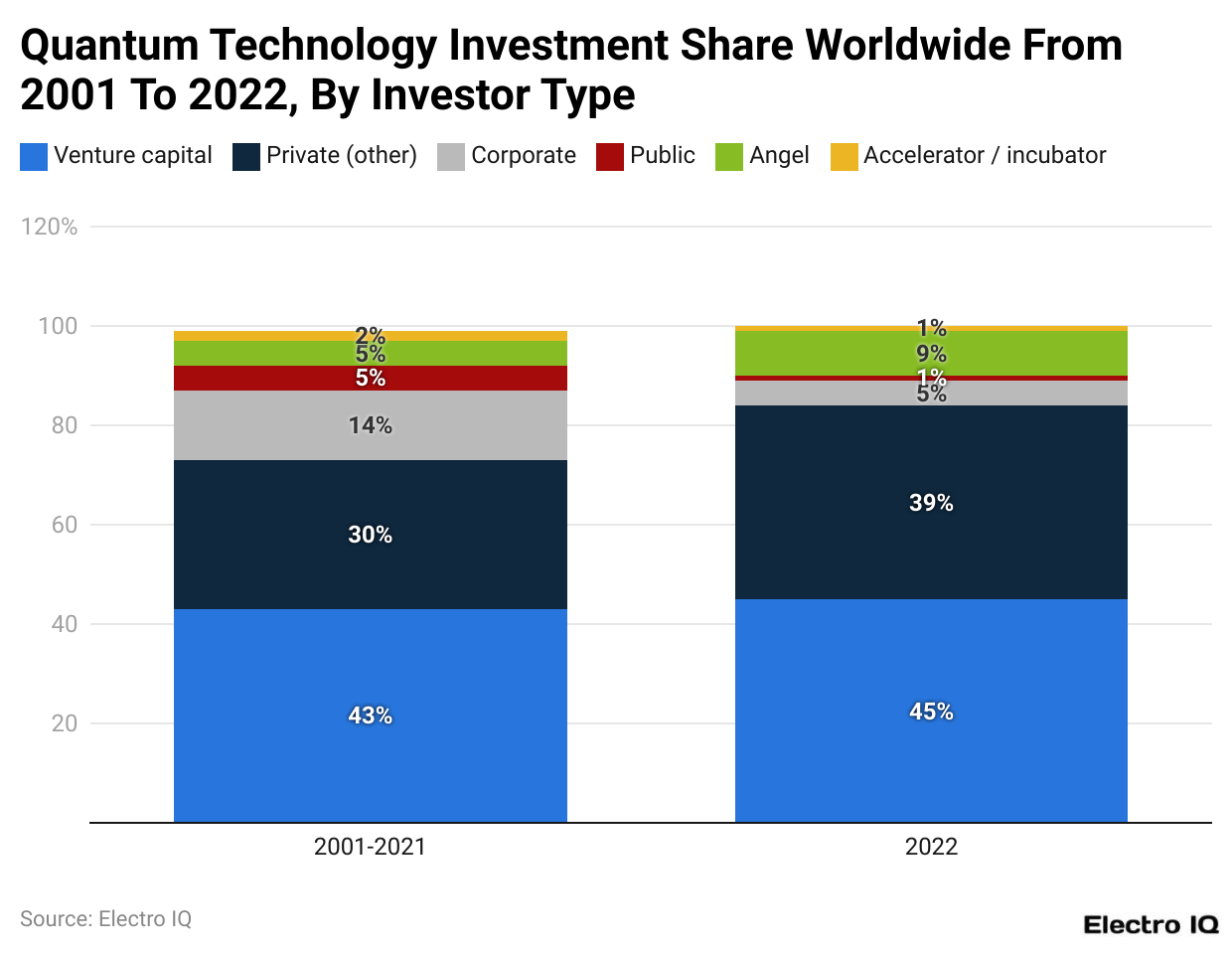
(Reference: statista.com)
- It is interesting to have a holistic understanding of the classification of the investments occurring with the quantum technology investments.
- Between 2001 – 2021, 43% of all funding was received from venture capitalists, 30% from private investments, 14% from corporate, 5% from public investments, 5% from angels and 2% from incubators.
- The Quantum computing statistics reveal a significant change in the investment share of quantum technology investment worldwide since 2022. As showcased there, 45% of venture capitalists and 39% of investment contributions come from private parties, followed by 9% of angel investors, 5% of corporate, and 1% each of public and incubator-based investments.
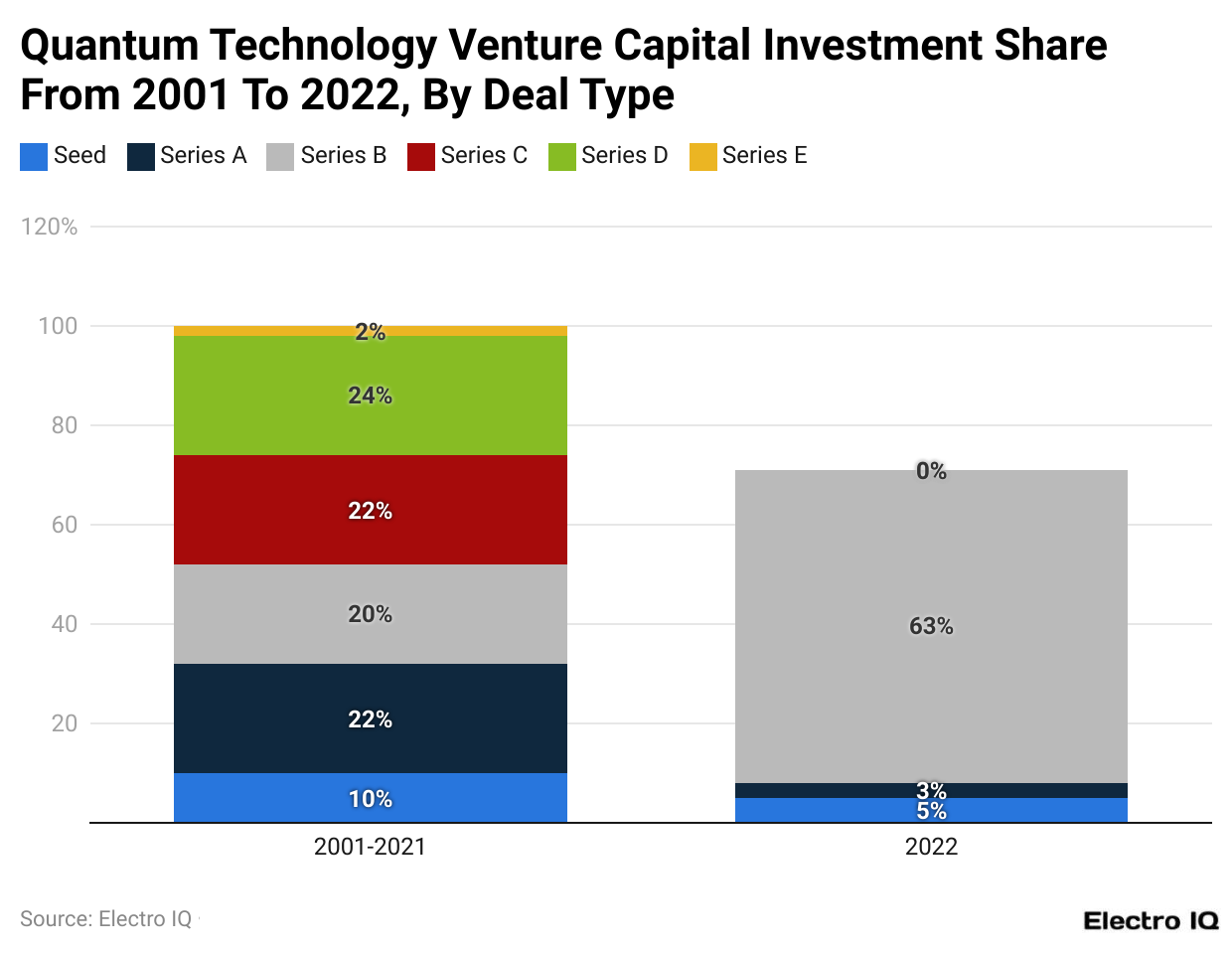
(Reference: statista.com)
- It is interesting to garner information about venture capitalist investment shares based on the quantum computing industry.
- Between 2001 – 2021, the investment was relatively evenly balanced with the following divisions: seed at 10%, Series A at 22%, Series B at 20%, Series C at 22%, Series D at 24%, and Series E at 2%.
- However, since 2022, the investment range has changed significantly, with 63% of quantum industry investment coming from series b funding.
Quantum Computer Forecast For Business Growth
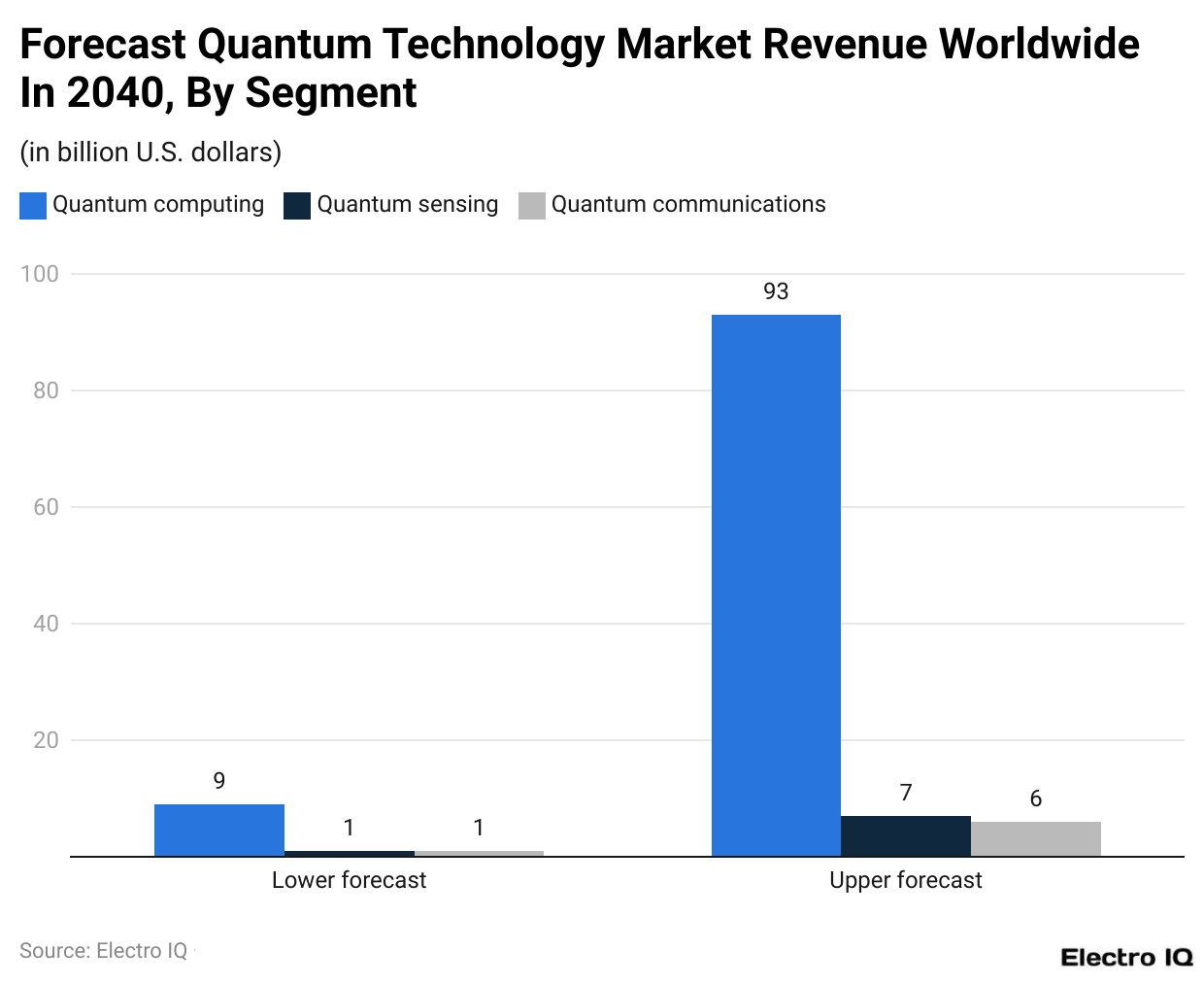
(Reference: statista.com)
- As of 2024, Quantum technology is still in its infancy regarding potential usage.
- However, quantum computing statistics predict that 2040 revenue will be between $9 billion and $93 billion.
- Apart from quantum computing, the revenue is expected to reach the same for other technologies, namely quantum sensing and quantum communications.
- Quantum sensing is predicted to post revenue between $1 billion to $7 billion.
- Meanwhile, quantum communication is expected to generate revenue between $1 billion and $6 billion.
Quantum Security Market Revenue
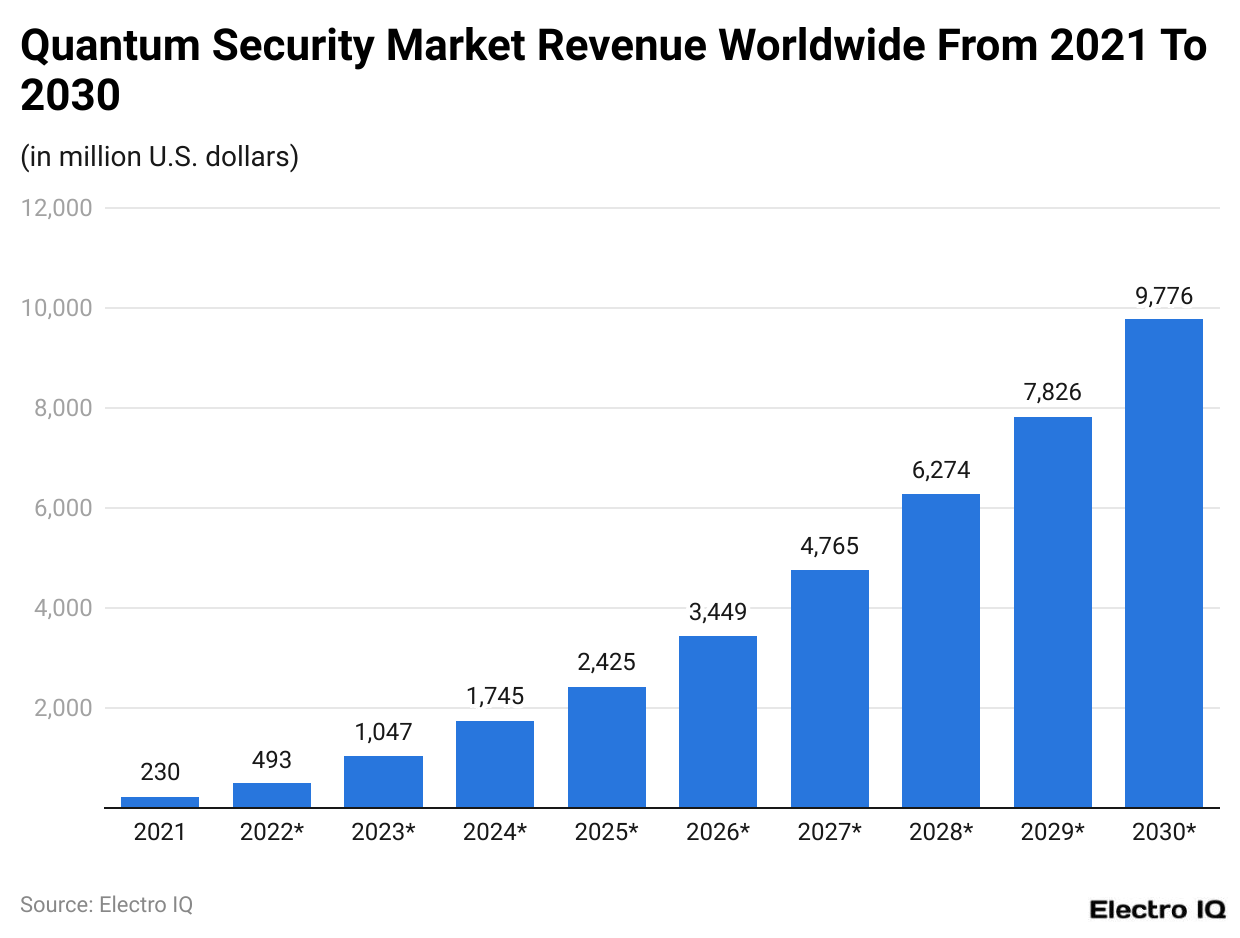
(Reference: statista.com)
- The quantum computing industry has witnessed significant growth, which the graph illustrates.
- As showcased by quantum computing statistics, the Quantum security market has revenue reached $1,047 million in 2023.
- It is predicted that the quantum security market is predicted to reach a revenue of $9,776 million by the end of 2030.
Quantum Security Worldwide Revenue
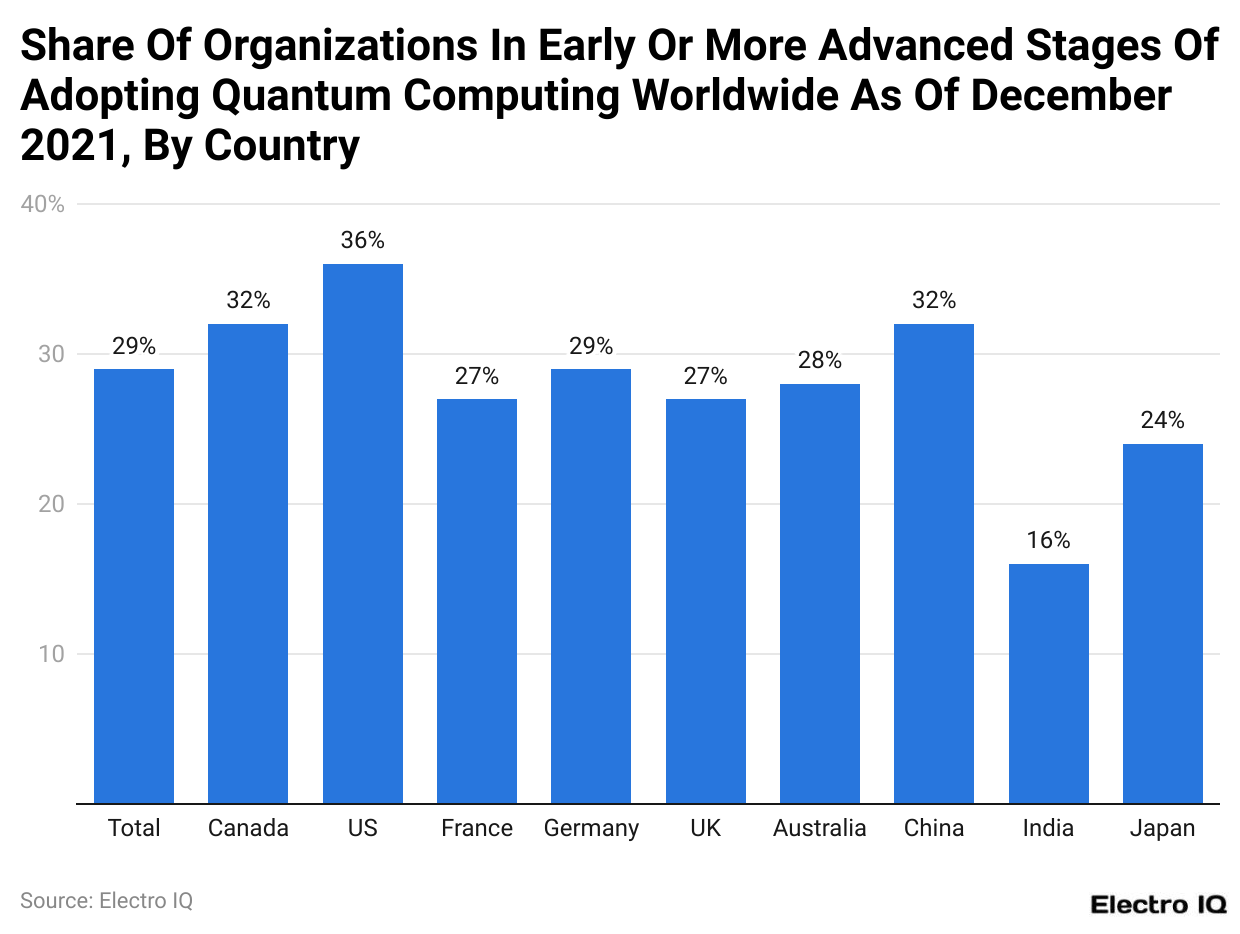
(Reference: statista.com)
- Referring to quantum computing statistics, the share of different organizations has been substantial and noteworthy.
- As of 2021, 29% of global adoption of quantum computing exists.
- The US, Canada, China, and Japan are the leaders in this field, with adoption rates of 36%, 32%, and 32%.
Quantum Security Market Worldwide Segmentation
(Reference: statista.com)
- It is interesting to have comprehensive information about the different industries utilizing the features of the quantum security market.
- Between 2021 and 2025, the financial and crypto services witnessed significant growth of 212%; telecom and internet services showcased growth of 182%.
- Between the period 2025 to 2030, the telecom and internet are expected to have high growth with 57%, followed by IoT and financial services, posting a CAGR of 45% and 40%.
Most Desired Quantum Computing Applications
(Reference: statista.com)
- Referring to quantum computing statistics, 100% of respondents feel that the requirement for quantum computing systems is essential for machine learning and other activities.
- Similarly, 86% of respondents feel the importance of machine learning in organizations across the biopharma industry, and they range from a wide variety of businesses.
Consideration Among Organizations While Assessing Quantum Computing Vendors Worldwide
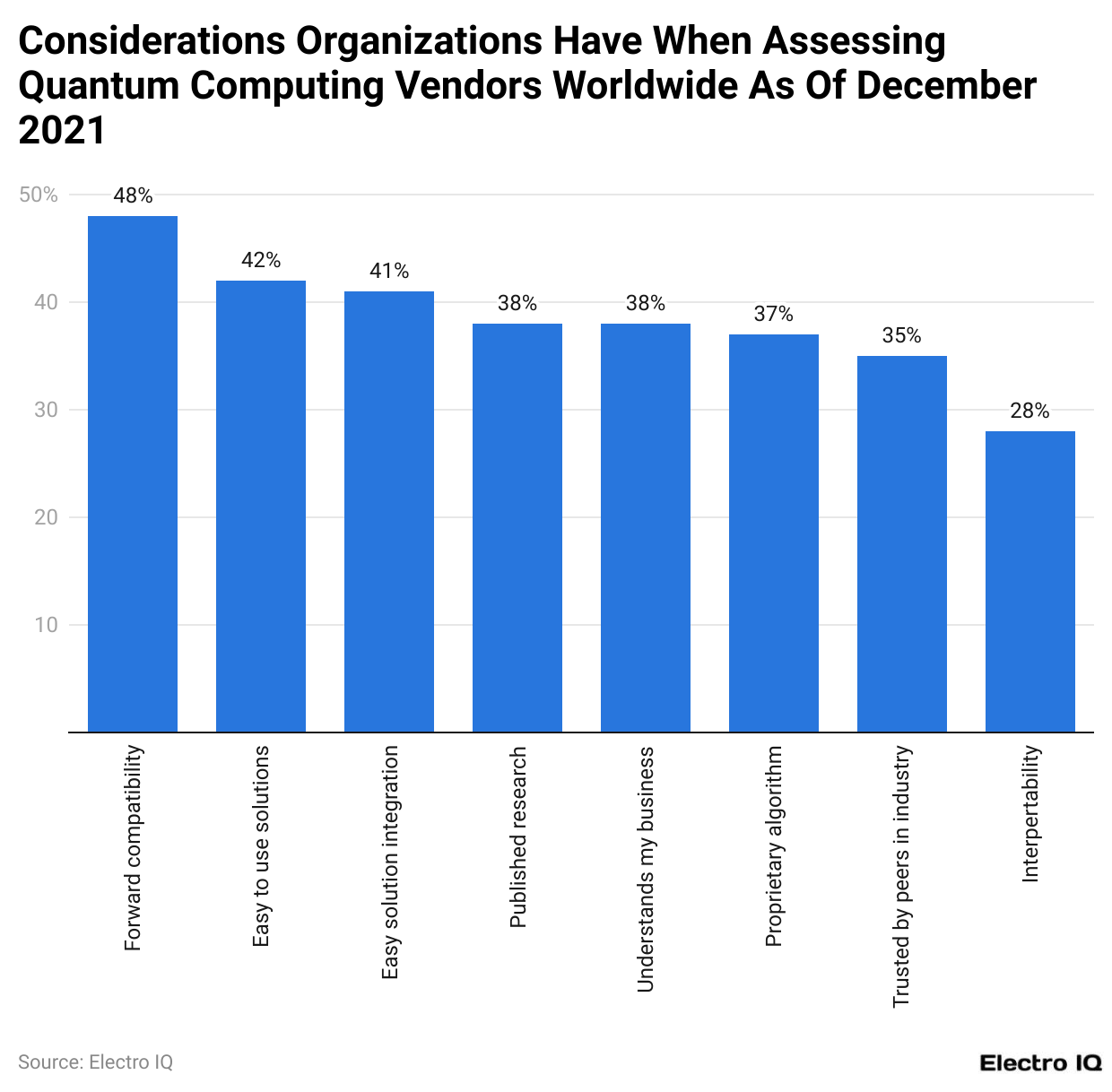
(Reference: statista.com)
- Going through the quantum computing statistics, it is evident that there have been a variety of usages going along with quantum computing.
- In 2021, forward compatibility has been the primary driving force among businesses that seek quantum computing vendors for forward compatibility-based requirements with 48%.
- Similarly, with activities such as easy-to-use solutions and easy solution integration, the organization considers revenue with 42% and 41%.
Quantum Sensing Startups’ Presence On A Global Scale
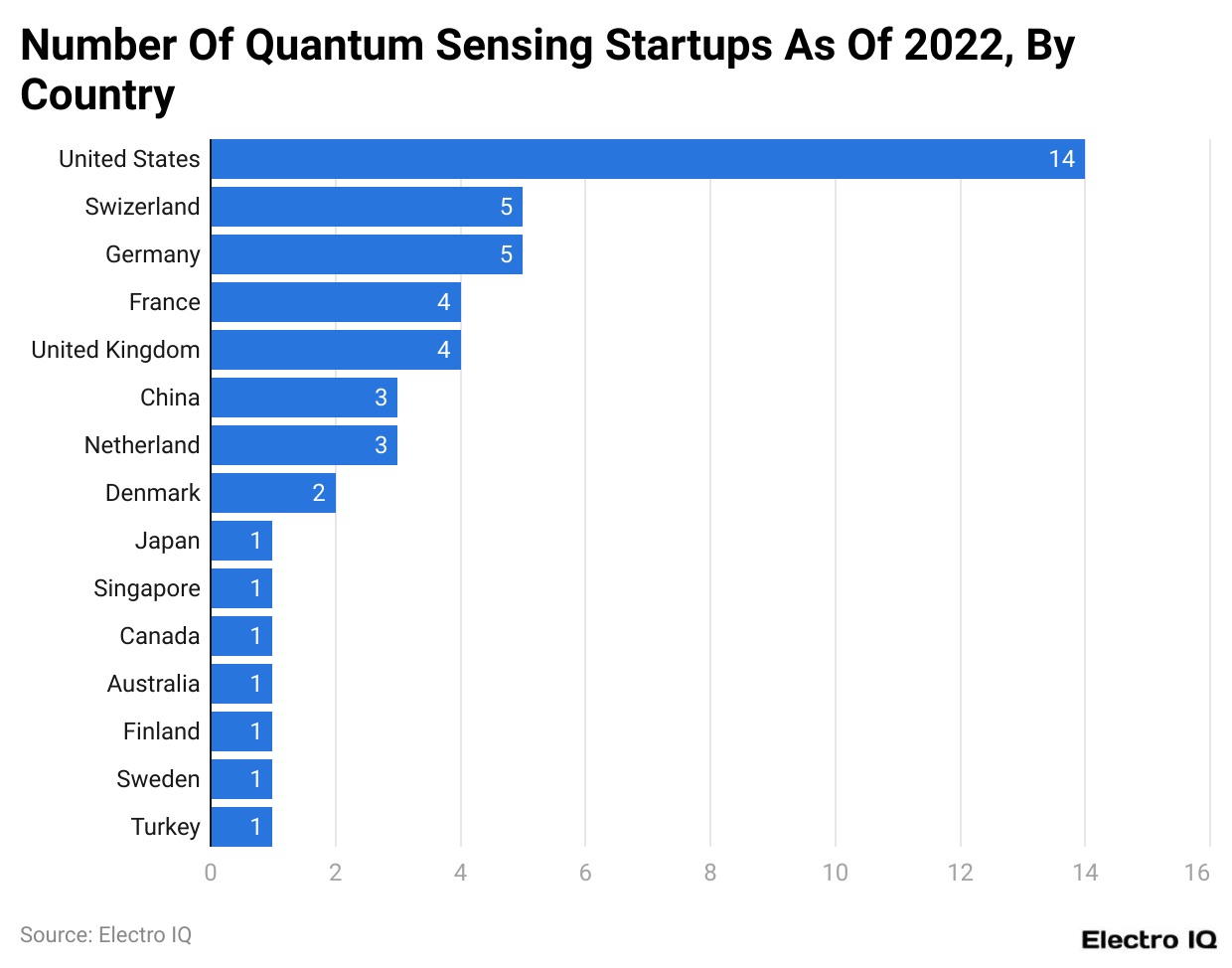
(Reference: statista.com)
- Quantum sensing refers to technologies that improve how we can measure, navigate, and explore the world by sensing changes in motion and electric fields.
- The United States is the leader in the number of Quantum sensing startups, with 14.
- Quantum computing statistics showcase that Switzerland and Germany hold the 2nd and 3rd position in the number of Quantum sensing startups, with 5 each.
Quantum Computing Funding As Per Country
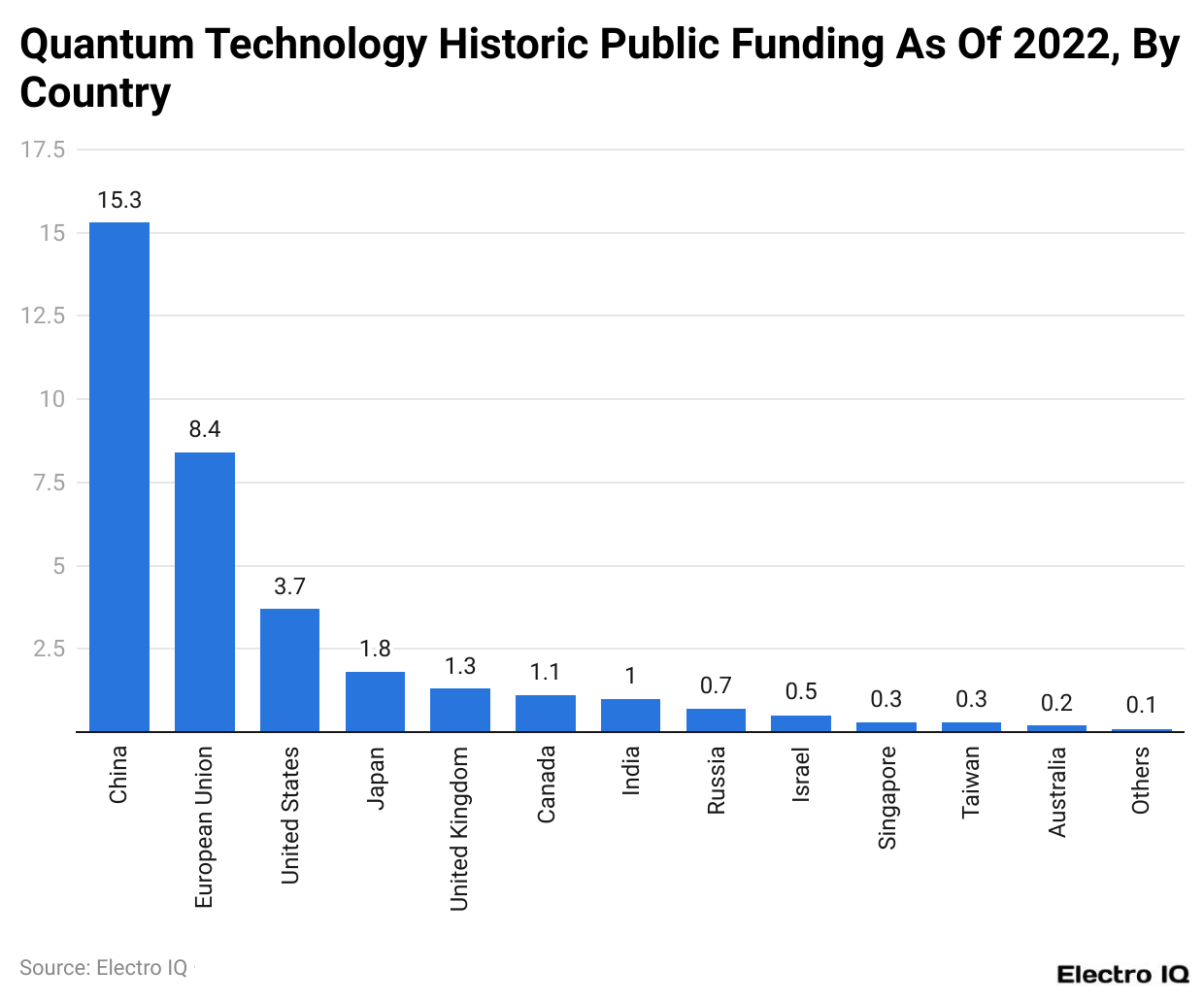
(Reference: statista.com)
- China has the highest quantum computing funding in 2022, with $15.2 billion.
- The Quantum computing statistics reveal that the EU and China have 2nd and 3rd most significant funding with $8.4 billion and $3.7 billion.
Quantum Computing Overview
Quantum computing, a technology that harnesses the power of quantum mechanics, has been gaining significant attention in recent years. The potential of quantum computers to solve complex problems at unprecedented speeds is driving interest across various industries. As we look into the statistics for 2023 and 2024, it’s clear that quantum computing is on the brink of revolutionizing several sectors, including finance, healthcare, and cryptography. In this analysis, we will explore Quantum Computing Statistics, focusing on market growth, investment trends, and the overall impact of this technology.
Market Growth and Revenue Projections
The global quantum computing market was valued at approximately US$1.5 billion in 2023. This figure reflects a significant increase from previous years, driven by advancements in quantum hardware software and increasing interest from governments and private sectors. By 2024, the market is expected to reach US$2.1 billion, representing a compound annual growth rate (CAGR) of around 40%. This rapid growth underscores the potential of quantum computing to become a cornerstone technology in the coming decade.
The North American region continues to lead quantum computing development, with the United States being the most significant contributor. In 2023, North America accounted for approximately 45% of the global quantum computing market. This dominance is expected to persist into 2024, with the region projected to hold a similar market share. However, other areas, particularly Asia-Pacific and Europe, are catching up with increased investments and strategic initiatives to advance quantum technology.
Investments and Funding
Investment in quantum computing has risen, with public and private sectors recognizing its transformative potential. Two thousand twenty-three global investments in quantum computing startups exceeded US$2 billion, a marked increase from US$1.4 billion in 2022. These investments are not limited to hardware development; significant funds are also directed toward quantum software and quantum-as-a-service (QaaS) platforms.
In 2024, investments are anticipated to grow, reaching over US$3 billion. This surge in funding is driven by the belief that quantum computing will play a critical role in solving some of the world’s most complex problems. Governments are also investing, with countries like China, the United States, and Germany leading the charge. These governments are funding quantum research and development to secure their positions as leaders in the quantum race.
Industry Applications and Adoption
Quantum computing’s potential applications are vast, and various industries are beginning to explore how this technology can benefit them. In 2023, the financial sector emerged as one of the early adopters of quantum computing, with banks and financial institutions investing in quantum algorithms to optimize trading strategies and risk management. Quantum Computing Statistics indicate that the finance sector accounted for nearly 25% of the quantum computing market in 2023.
By 2024, the healthcare industry is expected to make significant strides in adopting quantum computing. The ability of quantum computers to model complex biological systems and accelerate drug discovery processes is particularly appealing. Quantum Computing Statistics for 2024 project that the healthcare sector will account for 20% of the market, up from 15% in 2023.
Another critical application area is cryptography. Quantum computers have the potential to break traditional encryption methods, leading to increased research into quantum-safe encryption techniques. In 2023, spending on quantum cryptography solutions was approximately US$500 million, and this is expected to grow to US$700 million by 2024 as companies seek to protect their data against future quantum threats.
Challenges and Future Outlook
Despite the rapid growth and excitement surrounding quantum computing, several challenges remain. Quantum computers are still in the early stages of development, and achieving fault-tolerant quantum computing—a state where quantum computers can perform reliable calculations without errors—remains a significant hurdle. Quantum Computing Statistics for 2023 show that most quantum computers have error rates above 1%, which limits their practical applications.
In 2024, efforts to reduce error rates and increase the number of qubits (the basic unit of quantum information) in quantum processors will be crucial. Leading companies in the quantum space, such as IBM, Google, and Rigetti, are expected to make significant advancements in these areas. The number of qubits in commercially available quantum processors is projected to increase from around 127 in 2023 to over 200 by the end of 2024.
The future outlook for quantum computing is promising. While fully functional quantum computers that can outperform classical computers in all tasks may still be years away, the progress made in 2023 and expected in 2024 indicates that we are on the right path. Quantum Computing Statistics suggest that the market will continue to grow, with new applications and use cases emerging as the technology matures.
Conclusion
Quantum computing is expected to revolutionize the finance, healthcare, and cryptography industries. If one refers to quantum computing statistics, one will find that the market will be valued at approximately $1.5 billion in 2023. The industry is expected to grow with a CAGR of 40% and thus will most likely reach $2.1 billion by the end of 2024. In contrast, it is also important to note that the quantum computing industry faces a wide variety of challenges with high error rates and limits based on qubits.
Despite all these hurdles, quantum computing is expected to remain a pivotal part of technological investment in years to come.
Sources
FAQ.
Quantum computing refers to computational devices that use quantum mechanics to conduct quicker calculations than traditional computers.
Finance, health care, and cryptography are the major industries that focus on adopting quantum computing.
If one refers to quantum computing statistics, one will notice that the market is expected to reach $2.1 billion by the end of 2024.

Maitrayee Dey has a background in Electrical Engineering and has worked in various technical roles before transitioning to writing. Specializing in technology and Artificial Intelligence, she has served as an Academic Research Analyst and Freelance Writer, particularly focusing on education and healthcare in Australia. Maitrayee's lifelong passions for writing and painting led her to pursue a full-time writing career. She is also the creator of a cooking YouTube channel, where she shares her culinary adventures. At Smartphone Thoughts, Maitrayee brings her expertise in technology to provide in-depth smartphone reviews and app-related statistics, making complex topics easy to understand for all readers.

